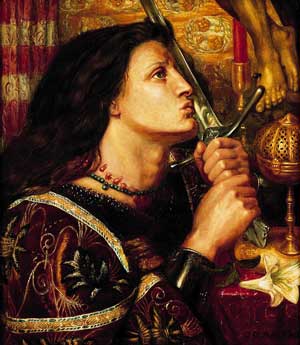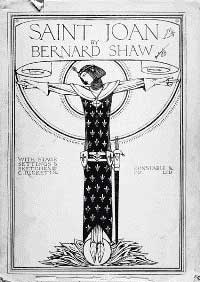Play (1924)
by George Bernard Shaw
Directed by Eric Tucker
Produced by Bedlam Theatre Company, New York, NY
Presented by Underground Railway Theater
Central Square Theater
Cambridge, MA
January 15 – February 8, 2015
With Andrus Nichols (Joan), Edmund Lewis, Tom O’Keefe, Eric Tucker

“Joan of Arc Kissing The Sword of Deliverance” (1863)
Musée des Beaux-Arts de Strasbourg, France
In 1429, Joan of Arc, a nineteen year old French peasant girl, has religious visions that inspire her to lead the French army to confront the English intruders at Orleans. She gets to see Charles, the Dauphin, who is not all that anxious about fighting the English, but she breathes some confidence into him and he gives her the mandate to lead the French forces. In the process, she inspires a great following and irritates the ecclesiastical authorities on both sides of the Channel who see her both as a witch and a political upstart who is endangering their powers. Committing the sin of individual religious inspiration in the face of control by the Church, she pays with her life, condemned to burn at the stake.
Shaw’s telling of the tale includes a post-mortem dialogue in which Joan and her various combatants and compatriots review the case and its consequences. By that point, she has been exonerated and they have been judged and condemned. A very brief post-post-mortem, set in 1920 after Joan has been sainted, follows. As a saint, Joan now has the capacity to return to life and she wonders whether she should do that. Her interlocutors ask her not to, with the play finally asking when the world will be ready to accept its saints.
There is something implicitly Nietzschean about Saint Joan. Its inquiry into the problematic nature of being too self-reliant and inspired calls to mind Nietzsche’s treatment of the Übermensch, or Overman. That ideal of inspired self-reliance was, in Nietzsche’s ironically more sanguine view, represented a next evolutionary stage of human development. Sometime in the future, he envisioned, great, autonomous individuals would emerge, no longer dependent on the constraints imposed by the so-called “herd moralities” which rely on the plurality of the weak. For Nietzsche, the ecclesiasts are prime exponents of the herd mentality whose collectivized power overcomes the heroic individual. Saint Joan is a more dour reflection on that possibility, an historic look at a moment at which such a presence – an Überfrau, a Superwoman – prevailed briefly, then was summarily executed.
Shaw’s much earlier play, Man and Superman (1903), was actually entitled with the Nietzschean theme in mind, but is a considerably lighter treatment of autonomy. His familiarity with Nietzsche’s notion strongly suggests its impact on Saint Joan.

of Bedlam Theater Company
Bedlam Theatre Company, brought together in 2012 by director Eric Tucker, who also appears in the play, and Andrus Nichols (Joan), is a four person troupe which, in this production, enacts the twenty-two characters of the play with conviction, imagination and remarkable clarity, considering the degree of overlap. Actually, Andrus Nichols, who plays Joan – vividly and passionately – has “only” that singular role to hold down, so the remaining twenty-one get divided up among Edmund Lewis, Tom O’Keefe and Eric Tucker.
Having seen quite a few plays done in this manner – frequently Shakespeare – I’ve found the result sometimes quite satisfying, sometimes not. When not, it has been so difficult to tell the characters apart that the coherence of the whole production suffers. Here, the characterizations given by each of the actors is so distinctive that, in most cases, it’s usually quite clear what’s going on. That’s not the case at every moment because of the intricacies of the plot, but it is much more than not. The artfully employed variations in accent and voice – from effete British to American, from high and squeaky to low – contribute significantly to this clarity.
Andrus Nichols as Joan is extremely convincing, exhibiting a robustness that at once exhilarates and is deeply human. After being convicted, Joan is given the option to recant or to die; Nichols’ account of that recantation scene is heartbreakingly beautiful, down to earth, human and believable. Joan subsequently realizes that the consequence of recanting is “just” a life sentence in jail and she responds differently a second time. The robustness, and pride and nobility, of that expression delivered by Andrus is also vivid and clear.
Lewis, O’Keefe and Tucker (who directs as well) provide the rest of the many roles with the facility of dramatic chameleons, rendering sometimes two or three characters apiece in a single scene. There are many points of humor in their renditions, sometimes as a result of the play’s ironies and sometimes as a result of the subtly appropriate caricatures in the performances. O’Keefe does a wonderful, effete Englishman, Lewis does a perfectly loveable and pathetic King “Charlie” and Tucker is a marvelous cockney hero who in his humility and ordinariness provides a final moral counterpart to Joan’s heroism.
The staging of the show is utterly simple and very ingenious. A part of the audience has to move several times during intermissions – asked to turn a different way, or sit in a different place to yield space for a new stage focus. It all works very fluidly, and is kind of fun. This is a long play – three hours – and all the moving around and resetting of the scenery works magic to keep things from bogging down.
– BADMan

Leave a Reply